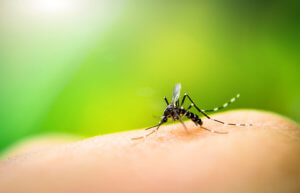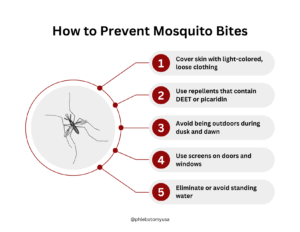17 Jul Why Do Mosquitoes Bite and Why Do the Bites Itch?
As summer arrives, we all look forward to enjoying the outdoors. But it also means dealing with mosquitoes. Have you ever wondered why they bite or why their bites itch so much? These tiny insects can turn a pleasant evening into a frustrating experience and leave behind itchy welts that can linger for days. Understanding how to prevent mosquito bites is important not only for comfort but also for health, as mosquitoes are known carriers of several diseases.
Understanding Mosquito Bites
Mosquitoes are more than just a summer nuisance. Their bites are the result of a complex biological process designed to extract blood, which female mosquitoes need for egg production. When a mosquito bites, it pierces the skin with its proboscis. This is a specialized mouthpart that allows it to draw blood. This process involves injecting saliva into the skin, which contains anticoagulants that prevent blood from clotting.
The saliva is what triggers our body’s immune response which leads to the swelling and itching that we associate with mosquito bites. While the irritation is annoying, the more significant concern lies in the potential for mosquitoes to transmit diseases such as West Nile Virus, Zika, Dengue, Chikungunya, and even malaria. Learning how to prevent mosquito bites can help reduce these risks and make your time outdoors more enjoyable.
Why Mosquitoes Are Attracted to Us
Some people get more mosquito bites than others because mosquitoes are drawn to carbon dioxide (CO2) and the smells our bodies give off. Factors like how fast our metabolism is, pregnancy, how much we move, and even drinking alcohol can attract mosquitoes. The bacteria on our skin and our genes also affect how appealing we are to them. Some studies suggest mosquitoes prefer people with type O blood, but this hasn’t been confirmed.
Mosquitoes have evolved to be highly efficient at locating their hosts. They can detect CO2 from up to 50 meters away. Once they’re close, they use body heat and odors to zero in on their target. Factors such as sweat, body temperature, and the presence of specific bacteria on the skin can all influence how attractive you are to mosquitoes. Additionally, studies suggest that genetics play a significant role in mosquito attraction, with some people naturally producing more chemicals that are appealing to mosquitoes.
How to Prevent Mosquito Bites
To avoid mosquito bites, use a mix of strategies that reduce your exposure and keep mosquitoes away. Wearing light-colored, loose-fitting clothes helps because mosquitoes are less drawn to lighter colors. Loose clothing makes it harder for them to bite through. Applying repellents with DEET or picaridin also offers strong protection and is safe for both adults and children.
Make sure your windows and doors have proper screens to keep mosquitoes out. Since they are most active at dusk and dawn, staying indoors during these times can help. If you need to go outside, treat your clothes and gear with 0.5% permethrin to keep mosquitoes away without applying it directly to your skin.
It’s also important to get rid of standing water around your home where mosquitoes breed. Empty containers like flowerpots, bird baths, and gutters to reduce the number of mosquitoes in your area.
Why the Bites Itch
When a mosquito bites, it leaves saliva on our skin, which helps it feed by stopping our blood from clotting. Our body reacts to the saliva, causing swelling and itching. The main reason for the itching is our immune system’s response, especially the release of histamine. Some people get itchier bites than others, especially if they’ve been bitten a lot before.
Histamine is the body’s way of defending against foreign substances. It makes blood vessels near the bite swell and can lead to redness and itching. With more bites, the body may become more sensitive to mosquito saliva. This causes more intense itching over time. This is why some people react more strongly to mosquito bites than others.
How to Prevent Mosquito Bites
- Wear light-colored and loose-fitting clothing to cover exposed skin.
- Use mosquito repellents that contain DEET or picaridin.
- Install or repair screens on windows and doors.
- Avoid being outdoors during dusk and dawn when mosquitoes are most active.
- Empty standing water from containers, such as flower pots and bird baths, where mosquitoes can lay eggs.
How to Treat Mosquito Bites
- Avoid scratching the bite to prevent infection.
- Apply calamine lotion or over-the-counter hydrocortisone cream to reduce itching and swelling.
- Place a cool, damp cloth on the bite.
- Take an antihistamine if you have severe reactions. (Always follow the recommended dosage.)
- Keep the area clean and dry.
Wrapping Up
Mosquito bites might be a small annoyance, but there’s a lot going on behind them. They help us understand more about our bodies and our genes. At Phlebotomy Training Specialists, we teach the vital skills needed in phlebotomy and also emphasize the significance of preventive measures in everyday life. Protecting yourself from mosquito bites is a simple yet essential way to maintain your well-being.
By following the prevention and treatment tips, you can enjoy your summer with fewer itchy interruptions. Remember, when dealing with mosquitoes, being prepared is key!
Sources:
- Genetic Literacy Project. “Are You a Mosquito Magnet? Science Explains Why.”
- “Variability in human attractiveness to mosquitoes.”
- “Differential mosquito attraction to humans is associated with skin-derived carboxylic acid levels.”
- Science Publishing Group. “Blood Feeding Preference of Female Aedes aegypti Mosquitoes for Human Blood Group Types.”
- Pest World. “Why Do Mosquito Bites Itch?”
- PLOS ONE. “Visualizing Non Infectious and Infectious Anopheles gambiae Blood Feedings in Mice.”


